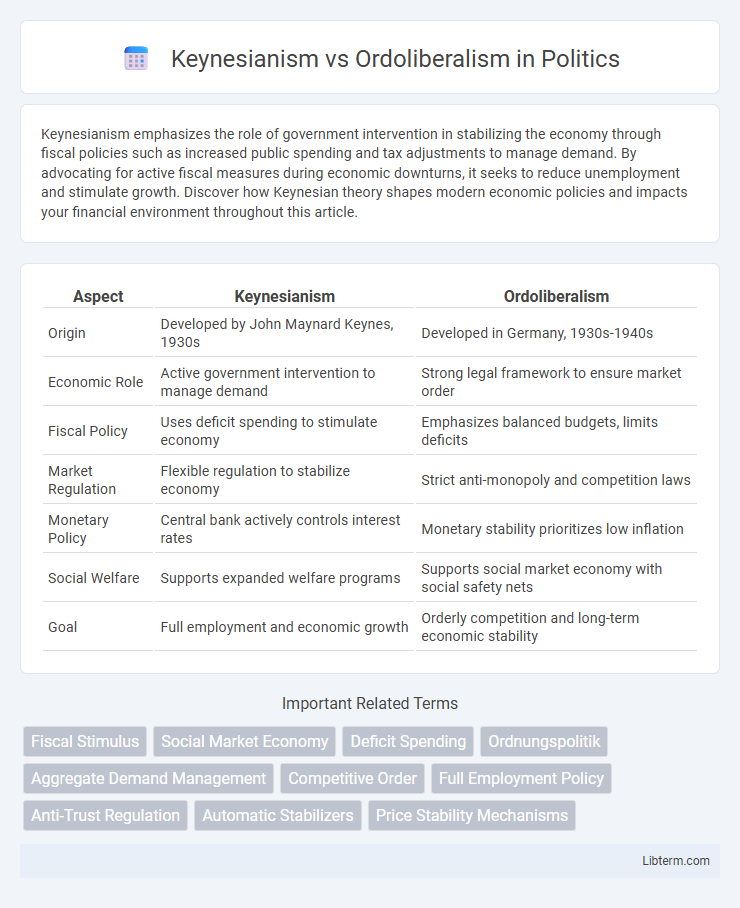Keynesianism emphasizes the role of government intervention in stabilizing the economy through fiscal policies such as increased public spending and tax adjustments to manage demand. By advocating for active fiscal measures during economic downturns, it seeks to reduce unemployment and stimulate growth. Discover how Keynesian theory shapes modern economic policies and impacts your financial environment throughout this article.
Table of Comparison
| Aspect | Keynesianism | Ordoliberalism |
|---|---|---|
| Origin | Developed by John Maynard Keynes, 1930s | Developed in Germany, 1930s-1940s |
| Economic Role | Active government intervention to manage demand | Strong legal framework to ensure market order |
| Fiscal Policy | Uses deficit spending to stimulate economy | Emphasizes balanced budgets, limits deficits |
| Market Regulation | Flexible regulation to stabilize economy | Strict anti-monopoly and competition laws |
| Monetary Policy | Central bank actively controls interest rates | Monetary stability prioritizes low inflation |
| Social Welfare | Supports expanded welfare programs | Supports social market economy with social safety nets |
| Goal | Full employment and economic growth | Orderly competition and long-term economic stability |
Introduction to Economic Thought: Keynesianism vs Ordoliberalism
Keynesianism emphasizes active government intervention through fiscal and monetary policies to manage aggregate demand and stabilize economic cycles, promoting full employment and growth. Ordoliberalism advocates for a strong legal framework that ensures market competition and prevents monopolies, prioritizing a rules-based economic order over direct intervention. Both approaches address economic stability but differ fundamentally in the role of state intervention and regulatory oversight within market economies.
Historical Background and Development
Keynesianism emerged during the Great Depression in the 1930s, founded on John Maynard Keynes' theory advocating government intervention to manage economic cycles and promote demand-driven growth. Ordoliberalism developed post-World War II in Germany, influenced by the Freiburg School, emphasizing a strong legal framework to ensure competitive markets and prevent monopolies while maintaining social order. While Keynesianism shaped many Western welfare states with active fiscal policies, Ordoliberalism became the basis for the social market economy model in Germany, balancing market freedom with regulatory oversight.
Core Principles of Keynesianism
Keynesianism emphasizes active government intervention in the economy to manage aggregate demand and smooth business cycles, advocating fiscal policies such as increased public spending and tax adjustments to stimulate growth during recessions. It supports the use of monetary policy to influence interest rates and investment, aiming to reduce unemployment and avoid prolonged economic downturns. The core principle centers on demand-side management, believing that government action is essential to achieve full employment and stable economic output.
Fundamental Tenets of Ordoliberalism
Ordoliberalism emphasizes the creation of a strong legal framework to ensure fair competition, prevent monopolies, and maintain market order, contrasting with Keynesianism's focus on demand management through fiscal and monetary policy. Central to Ordoliberalism is the belief that the state should actively shape market conditions, promoting economic stability and social welfare without direct intervention in market operations. This approach underscores rules-based governance and institutional frameworks to support a functioning competitive market economy.
Government Intervention: Theory and Practice
Keynesianism advocates for active government intervention through fiscal policies to stabilize economic cycles and mitigate unemployment by boosting aggregate demand. Ordoliberalism emphasizes a strong regulatory framework that ensures competitive markets while limiting direct state interference in economic activities, promoting long-term stability via rule-based governance. In practice, Keynesianism employs counter-cyclical spending to manage economic fluctuations, whereas Ordoliberalism focuses on establishing legal and institutional safeguards to prevent market failures and monopolies without extensive government spending.
Role of Markets and Competition
Keynesianism emphasizes active government intervention to stabilize markets and address demand fluctuations, advocating for fiscal policies that support employment and growth. Ordoliberalism stresses maintaining a strong legal framework to ensure competitive markets, preventing monopolies and preserving market order through regulatory oversight. While Keynesianism tolerates market imperfections to achieve social goals, Ordoliberalism prioritizes competition as a means to promote economic efficiency and prevent concentration of economic power.
Fiscal and Monetary Policy Approaches
Keynesianism advocates for active fiscal policy, using government spending and taxation to manage economic cycles, and supports monetary policy that influences interest rates to stimulate demand. Ordoliberalism emphasizes strict fiscal discipline, limiting government intervention to maintain market order, and prioritizes stable monetary policy focused on controlling inflation rather than demand management. These contrasting approaches reflect Keynesian reliance on counter-cyclical measures and Ordoliberalism's commitment to rules-based fiscal and monetary frameworks.
Economic Stability and Crisis Management
Keynesianism emphasizes active government intervention through fiscal policies to stabilize economic fluctuations and manage crises by boosting aggregate demand during downturns. Ordoliberalism prioritizes a strong regulatory framework ensuring market competition and rule of law, promoting long-term economic stability by preventing monopolies and structural imbalances. Both frameworks address economic stability, with Keynesianism focusing on demand management in crises and Ordoliberalism ensuring systemic order to mitigate crisis risks.
Social Welfare and Policy Implications
Keynesianism emphasizes active government intervention through fiscal and monetary policies to stabilize the economy and promote social welfare by reducing unemployment and supporting income redistribution. Ordoliberalism prioritizes a strong legal framework to ensure competitive markets, stability, and social order, advocating for state intervention primarily to maintain market rules and safeguard social welfare via regulatory oversight rather than direct economic stimulus. The policy implications of Keynesianism include deficit spending and welfare programs to counteract economic downturns, while Ordoliberalism favors structural reforms and regulatory mechanisms to prevent market failures and ensure long-term social and economic stability.
Contemporary Relevance and Critiques
Keynesianism emphasizes active government intervention and fiscal policy to stabilize economic cycles, maintaining strong relevance in addressing contemporary economic crises such as recessions and unemployment. Ordoliberalism, rooted in German economic thought, prioritizes regulatory frameworks ensuring competitive markets and rule of law, influencing modern European Union economic policies and debates on market regulation. Critics of Keynesianism highlight risks of inflation and public debt accumulation, while Ordoliberalism faces challenges regarding its rigidity and potential to limit fiscal flexibility in dynamic economic environments.
Keynesianism Infographic

 libterm.com
libterm.com